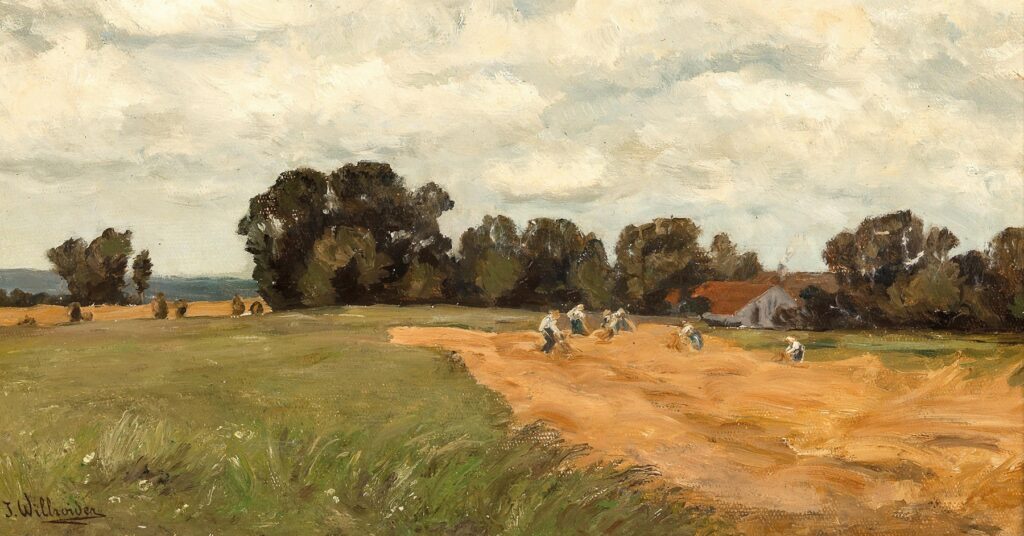An art reflection by Liv Booth on the hymn "Come, Ye Thankful People, Come" (LSB 892). This is one installment of a series providing reflections on works of art and music from a Lutheran perspective.
Pumpkins, candlelight, evenings of earlier dark … Autumn is the best time of year. Do not argue; I will not listen. My blood runs pumpkin spice. Once November has really settled over the world, and we’re almost ready for Advent, we Americans pause on a Thursday to thank the Lord for His provision so far and in anticipation of future blessings.
Although Thanksgiving is not technically part of the liturgical Church Year, Lutheran Service Book indulges us with a small selection of “harvest and thanksgiving” hymns. At my childhood church (Our Savior in Westminster, Mass.), the Thanksgiving Eve service was one of my favorites. A cornucopia spilled squashes and the best apples all over the altar; the sanctuary was bright and happy while outside the bare maples and oaks were creaking in the cold. My mother always had those little electric candles lit in the parsonage windows so that we came home to warmth and welcome. The hymns that evening were all about provision, the good earth, God’s bounty, and His joy in the physical world.
This hymn has that feeling, but it says far more than I ever understood as a child. In fact, I misunderstood some of the vocabulary for years! You’ll laugh, but there was a town called “Gardner” nearby, and somehow I thought that’s where God would store us all up evermore. Also, of course, “ears”? I’ve made some vocabulary notes just to clear up any confusion before we get started.
Spend a minute in this hymn with me; I hope singing it this Thanksgiving will be a richer experience for you! Happy Thanksgiving!
Vocabulary help
- Harvest Home — This hymn, from pre-Industrial-Revolution England, refers to the rich Fall community celebration the agrarian British called “Harvest Home.” Think State Fair with all the fun, friends, food and pride!
- ere — before
- tares — weeds, specifically “false wheat” or “darnel,” that is very hard to tell apart from wheat until just before harvest, or even as the grain is being sorted.
- blade, ear, corn — stages of wheat: sprout, closed head, fully developed grain
- garner — safe storehouse (like a silo) (Not Gardner, Massachusetts)
“Come, Ye Thankful People, Come”
LSB 892; text in the public domain. Some punctuation lightly edited. LSB notes these accompanying texts: Matthew 13:24–30; Revelation 22:7, 12, and 20; Isaiah 9:3.
1. Come, ye thankful people, come; raise the song of Harvest Home; All be safely gathered in ere the winter storms begin; God, our maker, doth provide for our wants to be supplied. Come to God's own temple, come; raise the song of Harvest Home. 2. All the world is God's own field, fruit unto His praise to yield; Wheat and tares together sown, unto to joy or sorrow grown. First the blade and then the ear, then the full corn shall appear. Lord of harvest, grant that we wholesome grain and pure may be. 3. For the Lord, our God, shall come and shall take His harvest home, From the field shall in that day all offenses purge away, Give His angels charge at last in the fire the tares to cast, But the fruitful ears to store in His garner evermore. 4. Even so, Lord, quickly come to Thy final Harvest Home; Gather Thou Thy people in, free from sorrow, free from sin, There, forever purified, in Thy garner to abide: Come with all Thine angels, come, raise the glorious harvest home.
Reflection:
Stanza 1
Every sweet Fall Festival reminds us that everything we love and everything that supports us comes from the Lord! He made the earth and everything that it bears.
“For from Him and through Him and to Him are all things. To Him be glory forever. Amen” (Rom. 11:36).
I picture Jesus kneeling in the new dirt on the third day of creation, sinking His fingers into the earth and causing lush grass to spring out of it. Then the trees rise up, bursting into leaf and fruit; vines tumble over the ground and bear melons, squash or grapes. Our little fairs and feasts remind us that the Lord of Creation cares even for us, in our little human needs, creating provision that delights our eyes and senses. Rushing to church together in gratitude is the best way to start our festival!
“Be filled with the Spirit, addressing one another in psalms and hymns and spiritual songs, singing and making melody to the Lord with your heart, giving thanks always and for everything to God the Father in the name of our Lord Jesus Christ” (Eph. 5: 18–20).
Stanza 2
A farmer plants a field, and the Lord planted the church. I want church to be a haven from the world, but even in church, while I’m thanking God for all the things on earth that bring me joy and pleasure, I know that it’s not heaven yet. It’s not even an earthly utopia. In fact, it’s not even entirely a gathering of God’s saints. Just as in the rest of my life, my church home is a mix of “wheat and tares.”
“Not everyone who says to me, ‘Lord, Lord,’ will enter the kingdom of heaven, but the one who does the will of My Father who is in heaven. On that day many will say to Me, ‘Lord, Lord, did we not prophesy in Your name, and cast out demons in Your name, and do many mighty works in Your name?’ And then will I declare to them, ‘I never knew you; depart from Me, you workers of lawlessness’” (Matt. 7:21–23).
Not everyone wants Jesus to love them. I myself resist His love. Sometimes I don’t want Him to tend me, to feed me, to guide my growth. I fear that I’m resisting harder than He can love me. Where am I headed?
“Do not marvel at this, for an hour is coming when all who are in the tombs will hear His voice and come out, those who have done good to the resurrection of life, and those who have done evil to the resurrection of judgment” (John 5:28-29).
Here’s the hard reality: Although He died for everyone, some don’t want Him. It’s a terrible truth we must trust Him through.
“Beware of false prophets, who come to you in sheep’s clothing but inwardly are ravenous wolves. You will recognize them by their fruits. Are grapes gathered from thornbushes, or figs from thistles? So, every healthy tree bears good fruit, but the diseased tree bears bad fruit” (Matt. 7:15–17).
I used to hear the line about blade/ear/corn very wrongly. The tune there is mounting and sounds triumphant, cheerful, grateful — but it describes the development of little shoots into either good wheat or bad tares. And the prognosis is not good for tares.
“‘Then do you want us to go and gather [the weeds]?’ But he said, ‘No, lest in gathering the weeds you root up the wheat along with them. Let both grow together until the harvest, and at harvest time I will tell the reapers, ‘Gather the weeds first and bind them in bundles to be burned, but gather the wheat into my barn’” (Matt 13:28–30).
Dear God, let me not be a tare! Grow me into wheat! This hymn is more serious than you thought, isn’t it?
Stanza 3
Out of this scary reality, our strong Lord promises to rescue us! He is patient, waiting in His love and wisdom until His prize-winning harvest is ready. He leaves the tares alone for the moment for the sake of the tender shoots who are growing slowly, looking forward to heaven and the new creation — the great Harvest Home celebration — not won by our merits, but by the blood of Jesus that was spilled into His field, flooding us with His divine life in our Baptism.
“And if you call on Him as Father who judges impartially according to each one’s deeds, conduct yourselves with fear throughout the time of your exile, knowing that you were ransomed from the futile ways inherited from your forefathers, not with perishable things such as silver or gold, but with the precious blood of Christ, like that of a lamb without blemish or spot” (1 Peter 1:17–19).
Only He can get us ready for Harvest Home. And He will come for us. He will gather us all up and shake out any of the uncertainties we’ve suffered under: the disappointments of failed human love, the fear that comes with our real and imagined inadequacies, the yearning of our hearts. Even in the midst of His overflowing blessings here on earth, we cry: how long, O Lord? How long until You make it all right? How long until you make it Eden again? Not a field, but a garden — safe and beautiful.
“They cried out with a loud voice, ‘O Sovereign Lord, holy and true, how long before You will judge and avenge our blood on those who dwell on the earth?’” (Rev 6:10).
The day of harvest will not be not safe or beautiful for tares. It means the revelation of their true identity; it means a bonfire.
“Nothing is covered up that will not be revealed, or hidden that will not be known. Therefore whatever you have said in the dark shall be heard in the light, and what you have whispered in private rooms shall be proclaimed on the housetops” (Luke 12:2–3).
“[Jesus] answered, ‘The one who sows the good seed is the Son of Man. The field is the world, and the good seed is the sons of the kingdom. The weeds are the sons of the evil one, and the enemy who sowed them is the devil. The harvest is the end of the age, and the reapers are angels. Just as the weeds are gathered and burned with fire, so will it be at the end of the age. The Son of Man will send his angels, and they will gather out of his kingdom all causes of sin and all law-breakers, and throw them into the fiery furnace. In that place there will be weeping and gnashing of teeth. Then the righteous will shine like the sun in the kingdom of their Father. He who has ears, let him hear’” (Matt. 13: 37–38).
Preserve us, O Lord, and rescue those most in need of Your mercy.
Stanza 4
So come quickly, Lord Jesus! There is joy ahead; You’ll catch us all up in Your joyful Harvest Home, rejoicing over us with singing, feasting, and pride over Your great reward: Me! Us! Your children! Your church! The angels, the saints before us, the whole crowd of family and friends that has been waiting until the right time will join together in You. Our burdens, fears and uncertainties will drop away as we rise, free and innocent at last, to our real home. Oh, bring Your harvest home!
“Let not your hearts be troubled. Believe in God; believe also in Me. In My Father’s house are many rooms. If it were not so, would I have told you that I go to prepare a place for you? And if I go and prepare a place for you, I will come again and will take you to Myself, that where I am you may be also” (John 14:1–3).
“Sing aloud, O daughter of Zion; shout, O Israel! Rejoice and exult with all your heart, O daughter of Jerusalem! The Lord has taken away the judgments against you; He has cleared away your enemies. The King of Israel, the Lord, is in your midst; you shall never again fear evil. On that day it shall be said to Jerusalem: ‘Fear not, O Zion; let not your hands grow weak. The Lord your God is in your midst, a mighty one who will save; He will rejoice over you with gladness; He will quiet you by His love; He will exult over you with loud singing. I will gather those of you who mourn for the festival, so that you will no longer suffer reproach” (Zeph 3:14–18).
Cover image: “Grain Harvest in the Alpine Forest,” Josef Willroider, 1838–1915. Public domain.






Refreshing to read this article, and yet disappointing, to think that recent seminary graduates are no longer observing Thanksgiving Eve / Day services because “it’s not in the liturgical Church calendar”. It’s a National holiday, yes; but do we as God’s people not want to assist our fellow citizens to get on their knees and thank our loving God for providing for us all 365/24/7?